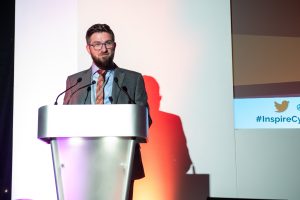By Train
One train station serves the city of Leicester which has direct services to London, Birmingham, Coventry and Sheffield. On arriving at Leicester, follow the directions below.
Address: 4th floor, Arnhem House, 31 Waterloo Way, Leicester LE1 6LP.
Use the pedestrian crossings immediately outside the train station to cross London Road towards the KPMG building (orange brick with bright blue windows). Arnhem House is the dark brown building to the left of the KPMG offices. Our offices are on the 4th floor.
By Road
We encourage all visitors to travel by public transport. However, if travelling by car is unavoidable, please follow the directions below to the nearest large pay and display car park – a short 10-minute walk to our new offices on Waterloo Way. Other car parks are available nearby – see below for more parking information.
From the M1: Exit at Junction 21 and head towards Leicester. At the first roundabout turn right, and then at the second roundabout turn left onto the A563 (south and east) with Fosse Park shopping centre on your left.
Follow signs for Wigston and Oadby, and at the end of the A563 turn left at a large roundabout onto the A6 (racecourse on your right). Carry straight on, following signs for the city centre, then go straight over a small roundabout (Victoria Park is on your left). At the next set of traffic lights, near to Victoria Park’s big wrought iron gates, turn left on to Granville Road. There is a pay and display public car park on your left.
From the M69: The M69 comes to an end at the same roundabout as Junction 21 of the M1. Go straight over this roundabout, and then at the second roundabout turn right. At the third roundabout turn left onto the A563 (south and east) with Fosse Park shopping centre on your left. Follow directions as given above.
From A6 South (Market Harborough): Take the A6 to the city centre, then follow signs for Oadby. Go straight over the large roundabout (racecourse on your left). Carry straight on, following signs for the city centre, then go straight over a small roundabout (Victoria Park is on your left). At the next set of traffic lights, near to Victoria Park’s big wrought iron gates, turn left on to Granville Road. There is a pay and display public car park on your left-hand side.
From Nottingham (alternative to M1): Leave Nottingham on the A606 and continue straight onto the A46. Follow signs for Leicester city centre onto Melton Road then Belgrave Road. At the first large roundabout go straight on, and at the second (and flyover) turn left onto St Matthew’s Way. Continue straight onto a set of traffic lights and another roundabout. Take the third exit onto St George’s Way (St George’s retail park on your left). Follow the signs for the train station. Follow the road round keeping in the middle lane, go over next two sets of traffic lights. At the second set , the police station is on your right and the road bears to the left. Continue through the next two sets of traffic lights past the train station on your left. There is a pedestrian crossing just before a church on the corner of University Road, turn right at these traffic lights.
Continue down University Road and go left when you reach the junction with Regent Road. Turn left at these traffic lights and follow the road to the top. The road begins to bend left and the entrance is situated just before the traffic lights on the right. (please note: the big gates on the right before the bend are for De Montfort Hall and not for the car park).
Car parking:
A variety of pay and display car parks are situated around the train station and the city centre, however we advise that you use the public car park at Victoria Park. Directions to Victoria Park car park from all directions can found in the directions section above.
Parking is also available at the train station.
https://www.leicester.gov.uk/transport-and-streets/parking-in-leicester/parking-charges/
https://www.justpark.com
How do I get to Learning and Work Institute from the recommended car park?
From Victoria Park pay and display car park to Waterloo Way office (recommended):
Cross over Granville Road and proceed towards London Road. Walk down London Road, towards the train station. Arnhem House is located opposite the train station, to the left of the tall orange brick KPMG building. Cross the road towards the building and the main entrance is in front of the pedestrian crossing.



